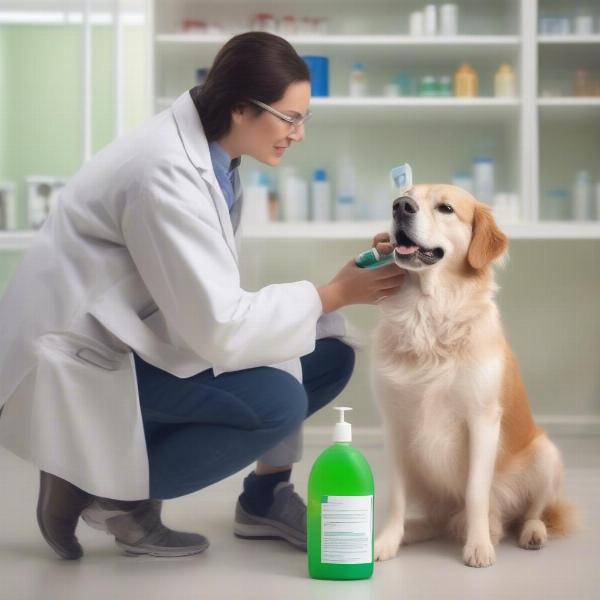Antibacterial sprays for dogs are a common item in many pet owners’ arsenals, used for everything from wound cleaning to sanitizing toys. But with so many options available, how do you choose the right one? This comprehensive guide will explore the uses, benefits, and potential risks of antibacterial sprays for dogs, helping you make informed decisions about your pet’s health and well-being.
Understanding Antibacterial Sprays for Dogs
Antibacterial sprays are designed to kill or inhibit the growth of bacteria on surfaces and, in some cases, on the skin. They can be useful for a variety of purposes, including cleaning minor wounds, disinfecting bedding, and controlling odor. However, it’s crucial to understand that not all antibacterial sprays are created equal, and some can be harmful to dogs if used incorrectly.
Choosing the Right Antibacterial Spray
When selecting an antibacterial spray for your dog, consider the following factors:
- Ingredients: Look for sprays containing safe and effective ingredients like chlorhexidine or benzalkonium chloride. Avoid products with harsh chemicals or fragrances that could irritate your dog’s skin.
- Purpose: Consider what you’ll be using the spray for. Some sprays are specifically formulated for wound care, while others are better suited for environmental cleaning.
- Vet Recommendation: Consulting your veterinarian is always recommended before using any new product on your dog, especially if they have sensitive skin or allergies.
Uses of Antibacterial Sprays for Dogs
Antibacterial sprays can be beneficial in a variety of situations:
- Minor Wound Care: Antibacterial sprays can help clean and disinfect superficial wounds, preventing infection.
- Hot Spots and Skin Irritations: Certain antibacterial sprays can soothe and treat hot spots and other skin irritations.
- Environmental Cleaning: Disinfecting bedding, toys, and other surfaces can help prevent the spread of bacteria and keep your dog’s environment clean.
- Odor Control: Some antibacterial sprays can help eliminate unpleasant odors caused by bacteria.
Potential Risks of Antibacterial Sprays
While antibacterial sprays can be helpful, it’s essential to be aware of potential risks:
- Skin Irritation: Some ingredients can irritate sensitive skin, causing redness, itching, or even allergic reactions.
- Ingestion: If ingested, certain antibacterial sprays can be toxic to dogs.
- Antibiotic Resistance: Overuse of antibacterial products can contribute to the development of antibiotic-resistant bacteria.
How to Use Antibacterial Sprays Safely
Always follow these guidelines for safe and effective use:
- Consult Your Veterinarian: Always check with your vet before using any new product on your dog.
- Follow Instructions: Carefully read and follow the product label instructions.
- Avoid Contact with Eyes and Mouth: Be extremely cautious to prevent the spray from getting into your dog’s eyes or mouth.
- Monitor for Reactions: Observe your dog for any signs of skin irritation or other adverse reactions.
 Consulting with a veterinarian about antibacterial spray
Consulting with a veterinarian about antibacterial spray
Conclusion
Antibacterial sprays can be a valuable tool for maintaining your dog’s health and hygiene. However, careful selection and proper usage are crucial to ensure their safety and effectiveness. Always consult your veterinarian for guidance and choose products specifically designed for dogs, avoiding harsh chemicals and fragrances. By following these guidelines, you can effectively utilize antibacterial sprays to keep your canine companion healthy and happy.
FAQ
- Can I use human antibacterial spray on my dog? No, human antibacterial sprays often contain ingredients that are toxic to dogs.
- What should I do if my dog licks antibacterial spray? Contact your veterinarian immediately.
- How often can I use antibacterial spray on my dog? Follow your veterinarian’s instructions.
- Are there natural alternatives to antibacterial sprays? Yes, discuss natural options with your veterinarian.
- Can I use antibacterial spray on my dog’s paws? Yes, but avoid sensitive areas between the paw pads.
- Can I use antibacterial spray on my puppy? Consult your veterinarian before using any products on a puppy.
- Can antibacterial spray prevent all infections? No, it can help reduce the risk but doesn’t guarantee complete prevention.
ILM Dog is your trusted source for comprehensive information on dog care, covering everything from breed selection and health to training, nutrition, grooming, and product recommendations. We offer expert advice and practical tips to help you provide the best possible care for your canine companion. For personalized advice or more information about our services, please contact us at [email protected] or call us at +44 20-3965-8624. ILM Dog is committed to helping you and your furry friend thrive.